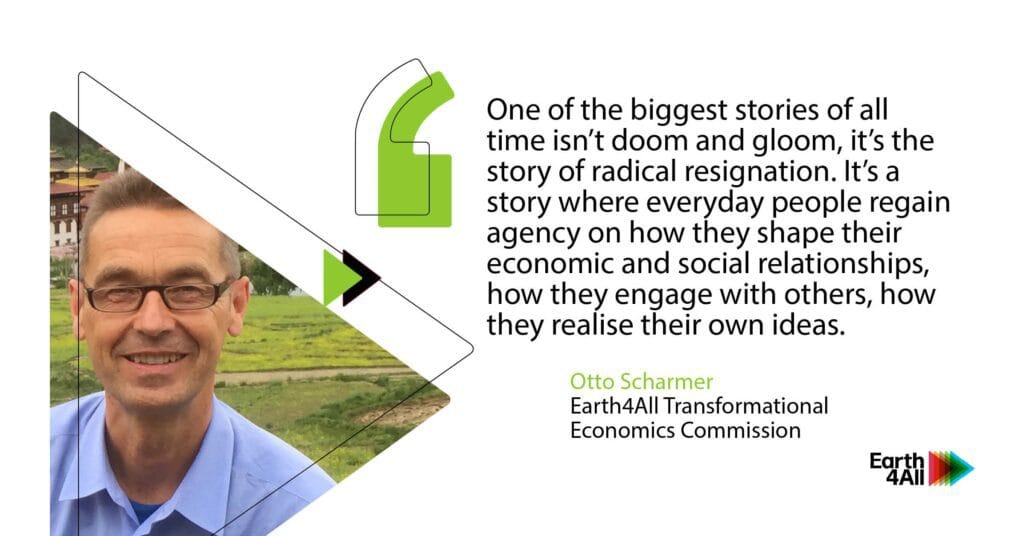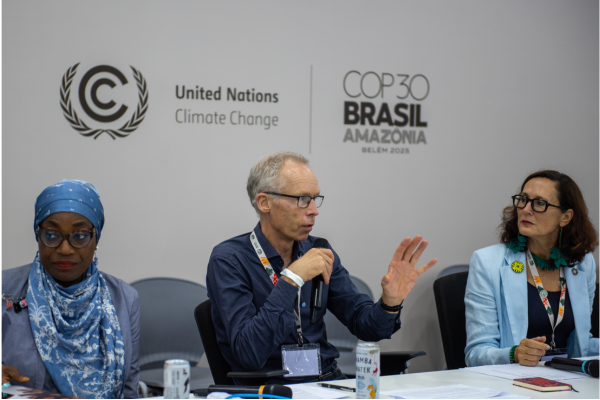
In this Q&A, Earth4All Transformational Economics Commission member Otto Scharmer explores how awareness-based systems change can help harness moments of disruption.
How do you approach transformation?
Time is an important concept when dealing with transformation.
There are moments in time when the past is no longer a good guide, and when we need to steer away. I work on learning from the experiences of the past, towards learning in moments of disruption, to examine emerging future possibilities.
Imagine you arrived from another planet – what would you notice first? Probably the environmental issues and social inequality, as well as the social systems breakdown that we have in an increasing number of places. In many systems today, we collectively create results that nobody wants: we destroy the planet, we inflict harm on each other and ourselves.
How did we get to the point of producing harmful results?
There are many facets to it, which is why it is necessary to adopt systems thinking to approach it. The issues we see today, whether environmental or social, are only the tip of the iceberg, the symptoms of a condition. But nine tenths of the iceberg are submerged: we must also tackle the root issues.
Most people know that the planetary emergency and the social system breakdowns that we face are related to the outdated economic system that we are operating, which is grounded in outdated frameworks of thought. The key question is: how can we transform our social and economic system for them to better address the planetary and social emergency?
In practice, how do we make it happen?
Very little focus is given to reforming our outdated economic system by mainstream institutions.
In practice, transformation can and will happen if supported by the right enabling infrastructures, in smaller applications just like in wide structures.
The big barrier that people face is ‘I don’t know how’. Until they do, old patterns will continue. People know about the issue, but not how to be part of a different story. We need to give people ways to be part of the movement – because change won’t come from big money, governments, or big technology. Change will come from everywhere: from everyday people, from grassroot movements, as well as from people in all sorts of institutions, including education institutions.
It gives me a lot of hope actually. We tend to focus on the doom and gloom but if we tap into the relational space of all the people waking up and shifting the patterns of how they operate, it really shows that we can create profound changes even in a short period of time.
Where should we start?
Change is already happening. One of the biggest stories of all time isn’t doom and gloom, it’s the story of radical resignation. It’s a story where the choices of everyday people make a huge change by walking away from the old system and regain agency on how they shape their economic and social relationships, how they engage with others, how they realise their own ideas. These will turn into initiatives, little ventures or activities that fulfil them.
In terms of collective action, the Earth4All book, which will be published in September, makes the case for five turnarounds, five sets of changes that take a holistic approach –system change that will enable long-lasting wellbeing for all.
Otto Scharmer is Co-Founder of the Presencing Institute and Senior Lecturer at the Sloan School of Management at the Massachusetts Institute of Technology (MIT)
Resources:
The Essentials of Theory U: Core Principles and Applications (Otto Scharmer, 2018)
Otto Scharmer’s website: www.ottoscharmer.com
More about the work of the Presencing Institute on www.presencing.org



